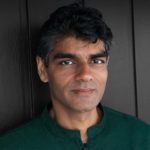World-ecology is a young discipline, but its perspective reaches into paleohistory. With such a very longue durée, world-ecology is well placed to understand and decode the ways ‘land’ remains a contested term. While classical Marxism is amply able to explain how enclosure turns land from commons into a fungible commodity, it stumbles in attempting to navigate the liberatory politics that might be found in understanding land as territory and as ecotone. World-ecology offers a way of thinking about land, and the web of life of which it is part, in ways that can resolve some of the analytical tensions around territory and land, though at the cost of developing new tensions around the political ecology of decolonization. This talk will conclude with proposals for research directions around those tensions.
For more info, visit Serralves website.

Raj PATEL is an award-winning author, film-maker and academic. He is a Research Professor in the Lyndon B Johnson School of Public Affairs at the University of Texas, Austin. He has degrees from the University of Oxford, the London School of Economics and Cornell University, has worked for the World Bank and WTO, and protested against them around the world. Raj co-taught the 2014 Edible Education class at UC Berkeley with Michael Pollan. In 2016 he was recognized with a James Beard Foundation Leadership Award. He has testified about the causes of the global food crisis to the US, UK and EU governments and is a member of the International Panel of Experts on Sustainable Food Systems. In addition to scholarly publications in economics, philosophy, politics and public health journals, he regularly writes for The Guardian, and has contributed to the Financial Times, Los Angeles Times, New York Times, Times of India, The San Francisco Chronicle, The Mail on Sunday, and The Observer. His first book was Stuffed and Starved: The Hidden Battle for the World Food System. His second, The Value of Nothing, was a New York Times and international best-seller. He is the co-author with Jason W. Moore of A History of the World in Seven Cheap Things. His acclaimed latest book, co-authored with Rupa Marya, is entitled Inflamed: Deep Medicine and The Anatomy of Injustice. His first film, co-directed with Zak Piper and filmed over the course of a decade in Malawi and the United States, is the award-winning documentary The Ants & The Grasshopper. He can be heard co-hosting the food politics podcast The Secret Ingredientwith Mother Jones’ Tom Philpott, and KUT’s Rebecca McInroy.

Gonçalo D. SANTOS is an anthropologist and a leading international scholar in the field of China studies. His research explores new approaches to questions of modernity, subjectivity, and social, technological, and ecological transformation in contemporary China. He is an assistant professor of socio-cultural anthropology in the Department of Life Sciences and a Researcher and Group Coordinator in the Research Center for Anthropology and Health (CIAS) at the University of Coimbra. Prior to joining the University of Coimbra in 2020, he held positions at the London School of Economics, the Max Planck Institute for Social Anthropology, and the University of Hong Kong. He is the author of Chinese Village Life Today (University of Washington Press, 2021) and the co-editor of Transforming Patriarchy (University of Washington Press, 2017). His research has been published in leading scientific journals in the fields of anthropology, science and technology studies, and Asian studies. He is a member of the Research Group on Culture and Society, Initiative for U.S.-China Dialogue on Global Issues, at Georgetown University, and is the founder and the director of Sci-Tech Asia, a transnational research network that focuses on the relations between technoscience, politics, and society in Asia and around the world. He is interested in comparative approaches that draw on Chinese and Asian perspectives and histories to challenge the hegemonic power of Euro-American epistemologies and narratives of modernity.
